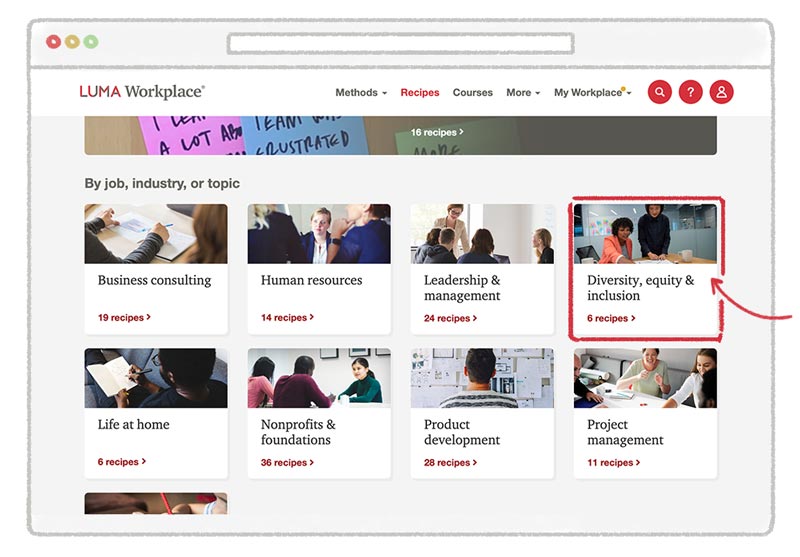In May of 2020, the LUMA team took pause as the world was processing the news of losing yet another Black life to police violence, adding George Floyd’s name to a tragically long list of lives disrupted by systemic racism. We saw, yet again, the ugly truth: Black Americans continue to face inequity and injustice every single day.
In recent years, thanks to the work of Ibram X. Kendi and others, the concept of anti-racism has become increasingly prevalent; the idea that it’s insufficient to simply be “not racist” has roots in the 20th-century civil rights movements. In order to achieve true justice, we must take a proactive stance in dismantling racist policies and institutions.
As a human-centered design company, we believe in the power of people. Whether those people happen to be in classrooms, courtrooms, corner stores, or corporate offices, we believe their opinions and experiences matter. Quite literally, LUMA was founded to help people harness the power of design to make things better — or, as Herb Simon said, change existing situations into preferred ones. Sadly, our society has designed itself into a situation that is far from preferred.
But this is the way we’ve always done things. We often hear this phrase when working in design sessions – a subconscious act to make peace with the status quo because change is difficult, especially for groups, teams, institutions, and countries.
But the stakes could not be any higher in this case.
We knew it was important to listen and learn, but taking action is at the heart of anti-racism and at the heart of design. So, over the past year, we asked ourselves how LUMA might be consciously and subconsciously contributing to the inequity that plagues our society. And, as a company currently composed mostly of white people, in an industry that historically lacks diversity, we view taking action as our responsibility.
We turned to the power of our own people. We formed an internal, cross-functional team to identify key priority areas for change. The team adopted the name LUMA Social Justice League, and it used over a dozen methods from the LUMA System to facilitate conversations about how we might create a more equitable company and society. With support from leadership, and after hearing from the entire organization, the team recommended the following:
- Require employee training about implicit biases
- Audit and revise our hiring practices
- Improve our communications to be more inclusive
- Use the LUMA System and the power of design to combat racism
- Become more intentional about supporting and celebrating diversity internally
We have been making progress on all five action areas, but today we want to highlight an outcome of action item four: A new recipe collection on LUMA Workplace focused on diversity, equity, and inclusion.
This collection was designed by members of the LUMA Community based on their real-life experiences working in their communities, at nonprofits, in government, and at home. We took their collective knowledge and made it available in the form of an entire collection of recipes on our digital platform LUMA Workplace. (Reminder: Recipes are tried-and-true strategies for using human-centered design in your next meeting, session, event, or project.)
These particular recipes were all formulated with one goal in mind: to combat racism.

Recipe topics include:
- Prepare to address systemic racism
- Align on ways to create a more inclusive environment
- Recognize and address implicit bias in everyday life
- Question biased thinking and stereotyping with direct observation and inquiry
- Reflect on your own background to better understand bias and take action
- Gain empathy for someone else by learning about their life experiences
We hope that you’ll find these recipes useful and discover ways to put them into action at work and in your personal life. If you do use them, we welcome you to share your stories with us. We’re open to your feedback; you can always reach us by emailing communications@luma-institute.com.
Meanwhile, at LUMA, we’ll keep working to become a company that lives up to our beliefs and values. We recognize that all of these priorities require consistent, sustained, intentional effort. And we’re doing our best to help create a more preferred future for all. We hope you’ll join us in that pursuit.

